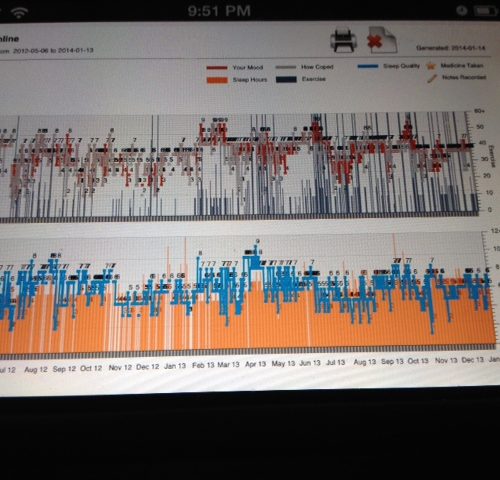I’ve thought about this for some time, and I’ve got to confess that the word ‘recovery’ doesn’t work for me when it comes to my mental health. That’s fine. It may work for plenty of other people, and that’s fine too. But when I think of my bipolar 1 disorder, I know it’s something that is lifelong; there is no cure for it and it’s something I’ve had to come to terms with over the course of the past six and a half years. To me, that means that I can’t ‘recover’ from it.
I’m aware that ‘recovery’—whatever one may consider it to be—isn’t linear, and that it means something different to everyone depending on their illness and circumstances. It can mean that you are stable and functioning well, that you’re in remission from your illness, which is completely valid if it works for you. I have no problem with that, but it doesn’t feel right for me. For me, the goal for my treatment is to be as stable as I can be for as long as I can be, and to reduce the amount of time my mood swings last and the severity of my highs and lows. Along with that, my other goals for my life in regards to my illness are to function as best I can with it, to be happy, and to work around it.
To me personally, ‘recovery’ would mean that my illness isn’t part of my life anymore, and that’s far from the truth. I have to deal with bipolar every day. The moment I wake up in the morning, I have to do a gut-check for symptoms. The rest of the time, I must monitor myself for the side effects of medication; be cognizant of my mood; know when to ask for help; be aware of triggers; maintain something of a routine; attend appointments; ensure I have adequate supplies of meds; actually ask for help when I need it; and avoid things I know will cause my mood to shift. This is part of my daily life and always will be, so I don’t see it as ‘recovery’…and that isn’t a bad thing.
Accepting the fact that I will have this illness for the rest of my days isn’t me being negative; it’s me being realistic and self-aware. Accepting the fact that because of my illness there may be limits to what I can do, or that I need to do things differently in order to remain as stable as possible, is not me being negative or not fighting. In fact, it’s quite the opposite. It’s me being aware of my illness and its effects; it’s me being completely determined to deal with it head on and not let it beat me. It’s me learning what works for me and what doesn’t. It’s me figuring out what will be best for me and what will keep me healthy for the longest period of time possible. It’s me fighting my condition with knowledge, therapy, research and experience to be able to live my life in the best possible way and be as happy as I can be.
None of these things mean that I have given up or that I am not fighting; they don’t mean that I lack hope, and they certainly don’t mean that I don’t have a positive attitude. They simply mean that I know my limits, and I am aware of how to manage my illness the best way I can. These are good things, but they are not ‘recovery’; they are my way of playing the hand life has dealt me with as much grace and dignity as possible.
So no, I haven’t ‘recovered’ from bipolar, and I never will. But I AM in remission, and that is the absolute best I can expect. Life is good.

I respectfully disagree. I am also a bipolar nurse with a new blog. I’ve just started to read about your story so forgive me if this is too forwad.(So far I have enjoyed. ) Mentalhealth.gov says recovery is a process of change through which individuals improve their health and wellness, live a self-directed life, and strive to achieve their full potential. In my opinion, you are already doing it regardless of what you call it. It is true that you will never be in “remission”, not truly, but all mental illneses and substance abuse disorders have relapses.
LikeLiked by 1 person
Thank you for your comments. I checked out your blog too and find it very interesting. Nice to see another bipolar nurse out there in cyberspace!
LikeLike
Thank you. I look forward to reading more of your blog.
LikeLiked by 1 person
bpnurse, I agree with your post, I admit I don’t know much about being bipolar, I’m reading as much as I can to further my understanding.
LikeLiked by 1 person
I don’t know what to call it. I just know that I can tell when I have forgotten my meds…I am a mess.I too, am a nurse with bipolar 1….you gave me encouragement to take 2 atypicals and still losse weight.
I have not done that but at least I stopped gaining.
bizi
LikeLiked by 1 person